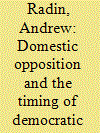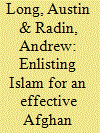|
|
|
Sort Order |
|
|
|
Items / Page
|
|
|
|
|
|
|
| Srl | Item |
| 1 |
ID:
153938


|
|
|
|
|
| Summary/Abstract |
A substantial literature urges delaying elections and liberalization in postwar societies. There is little work, however, on when and how international missions that intend to delay elections and the transfer of sovereignty, such as those in Kosovo and Iraq, are able to do so. To fill this gap, I propose a theory that identifies conditions under which two forms of domestic opposition—elite objections and mass demonstrations—can at times force the international community to adopt an earlier transition plan. Following the predictions of the theory, I show that international occupations in Kosovo and Iraq were only able to implement their preferred transition plans when conditions were unfavorable for domestic opposition: when the absence of centralized authority within key groups makes an elite boycott unlikely, and when international policy does not threaten a major group's nationalist goals, making the emergence of widespread mass demonstrations doubtful. The implication for policy is that attempting to delay elections and liberalization is only advisable when domestic opposition is unlikely to be effective.
|
|
|
|
|
|
|
|
|
|
|
|
|
|
|
|
| 2 |
ID:
114969


|
|
|
|
|
| Publication |
2012.
|
| Summary/Abstract |
An effective police force is central to providing security in general and is considered especially critical in counter-insurgency. The US Army's counter-insurgency doctrine embodied in Field Manual (FM) 3-24 notes that 'the primary frontline [counter-insurgent] force is often the police - not the military'. The strength and effectiveness of the police is important for waging counter-insurgency for two reasons. Firstly, the police can help directly in fighting the insurgents. In Afghanistan, police fight side by side with the military, and help provide security in many of the most dangerous areas. Secondly, building an effective and trustworthy police force is necessary for legitimising the existing government. When the police force fails to provide security (or worse, preys upon the population) the government is delegitimised. At the same time, the population's cooperation with the police is essential for effective policing. Police that are seen as outsiders simply cannot elicit the trust necessary to police a community. The importance of gaining the population's support also echoes the US military's 'population-centric' approach to counter-insurgency, as enumerated by former International Security Assistance Force (ISAF) commanders General Stanley McChrystal and General David Petraeus. Support from the population is essential to the police's role in fighting the insurgency since the population can, for example, provide the intelligence essential for identifying, locating and killing insurgents.
|
|
|
|
|
|
|
|
|
|
|
|
|
|
|
|
| 3 |
ID:
136630


|
|
|
|
|
| Summary/Abstract |
In developing U.S. intervention policy in Kosovo, Iraq, Libya, and most recently Syria, the 1992 to 1995 war in Bosnia and Herzegovina1 has repeatedly been used as an analogy. For example, John Shattuck, a member of the negotiating team at the Dayton peace talks that ended the war, wrote in September 2013 that for Syria “the best analogy is Bosnia…Dayton was a major achievement of diplomacy backed by force…A negotiated solution to the Syria crisis is possible, but only if diplomacy is backed by force.”2 Many other analysts and policymakers with experience in the Bosnian conflict—such as Nicholas Burns, the State Department spokesman at the time; Christopher Hill, a member of Richard Holbrooke's negotiating team; and Samantha Power, who began her career as a journalist in Bosnia—also invoked the Bosnian war to urge greater U.S. involvement in Syria.3 Although the rise of ISIS has significantly altered the conflict over the last year, echoes of the Bosnian conflict remain in Syria: the conflict is a multiparty ethnic civil war, fueled by outside powers, in a region of critical interest to the United States.
|
|
|
|
|
|
|
|
|
|
|
|
|
|
|
|
|
|
|
|
|